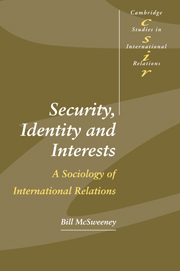Book contents
- Frontmatter
- Contents
- Acknowledgements
- Introduction
- 1 The meaning of security
- Part I Objectivist approaches to international security
- Part II Theorizing security: the turn to sociology
- 5 A conceptual discussion
- 6 The social constructionist approach
- 7 The limits of identity theory
- 8 Agency and structure in social theory
- 9 Seeing a different world: a reflexive sociology of security
- Part III Practising security
- Bibliography
- Index
- CAMBRIDGE STUDIES IN INTERNATIONAL RELATIONS
7 - The limits of identity theory
Published online by Cambridge University Press: 22 September 2009
- Frontmatter
- Contents
- Acknowledgements
- Introduction
- 1 The meaning of security
- Part I Objectivist approaches to international security
- Part II Theorizing security: the turn to sociology
- 5 A conceptual discussion
- 6 The social constructionist approach
- 7 The limits of identity theory
- 8 Agency and structure in social theory
- 9 Seeing a different world: a reflexive sociology of security
- Part III Practising security
- Bibliography
- Index
- CAMBRIDGE STUDIES IN INTERNATIONAL RELATIONS
Summary
From different backgrounds, Wendt and Campbell bring the cognitive dimension of collective identity to bear on the formulation of foreign policy in a mode of inquiry relevant to security and in contrast to the materialist, structural mode of security studies. That tradition, it will be recalled, effectively ignores collective identity as a dynamic factor in the construction and analysis of security, since it assumes that all states share a common identity, fixed and given prior to interaction and immune to change through any learning process in which the state actors may engage.
Their approach can be characterized as a kind of cultural determinism, however, pressing identity beyond its explanatory weight. In the identity theory of Wendt and Campbell the cognitive is stressed to the point that they lose sight of an essential material feature of all questions of security and identity-formation. This concerns the place of interests in the perception of security and in the management and transformation of collective identity.
Several points of criticism may be noted, which bear upon later discussion of a theoretical framework appropriate to the understanding of security. These points will be illustrated by concrete example to highlight the deficiency of identity theory in general. This is followed by consideration of an alternative approach, marking a different turn to sociology, which escapes the limits of identity theory and – with some modification – can be seen to offer a richer conception of social constructionism.
- Type
- Chapter
- Information
- Security, Identity and InterestsA Sociology of International Relations, pp. 126 - 137Publisher: Cambridge University PressPrint publication year: 1999
- 1
- Cited by

